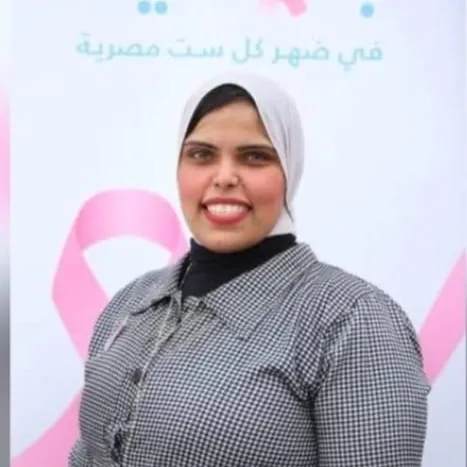
Mai, Egypt
My journey began with the passing of my mother when I was 14. At that moment, I felt as though life had come to a standstill. From that point forward, I was driven by a desire to protect every mother from any life-threatening illness, and to safeguard children from the devastating experience of losing their mother.
I enrolled in university with the primary goal of studying psychology and serving the community. I undertook internships in various fields related to women's health, including hospitals and health units. It was there that I first learned about breast cancer.
At that time, there was insufficient awareness of this disease or its symptoms. I sought to educate myself further by interacting with doctors in the health units, researching online resources, and learning everything I could about the disease. I wanted to understand how I could contribute to raising awareness within the community, promoting early detection, and supporting women and their families in the event of a diagnosis.
My pursuit of knowledge and action continued until I discovered Baheya Foundation. I joined their team in a medical secretarial role. I was the first person to interact with a cancer fighter upon her arrival at the hospital, and I witnessed the mix of negative emotions, questions, and fear of the disease and the future that they carried. Each of these brave women arrived in a state of confusion, with questions such as: Will I recover? Will I be alright? Will I be able to return to my children?
My role here was to facilitate all procedures, guide the patients within the hospital, and alleviate their negative emotions.
Three years ago, I realized that I could play a greater role in supporting these women. I decided to move to the psychological support department at Baheya. Through this role, I was able to provide support not only to the patients during their illness but also to their families. This often led to the development of friendships with family members during hospital visits, through hospital-organized trips, or even through home visits.
Over time, we build trust with the patients, which allows them to believe and accept our words when we tell them that their treatment period is just a phase and that it will pass with all its difficulties. This gives them positive energy to help them fight the disease and makes them feel that they are not alone in their treatment journey.
For me, supporting women with cancer is a personal mission against the idea of disease or death because I have always believed that illness is not the end, and that every woman has the right to recover and return healthy to her children.
